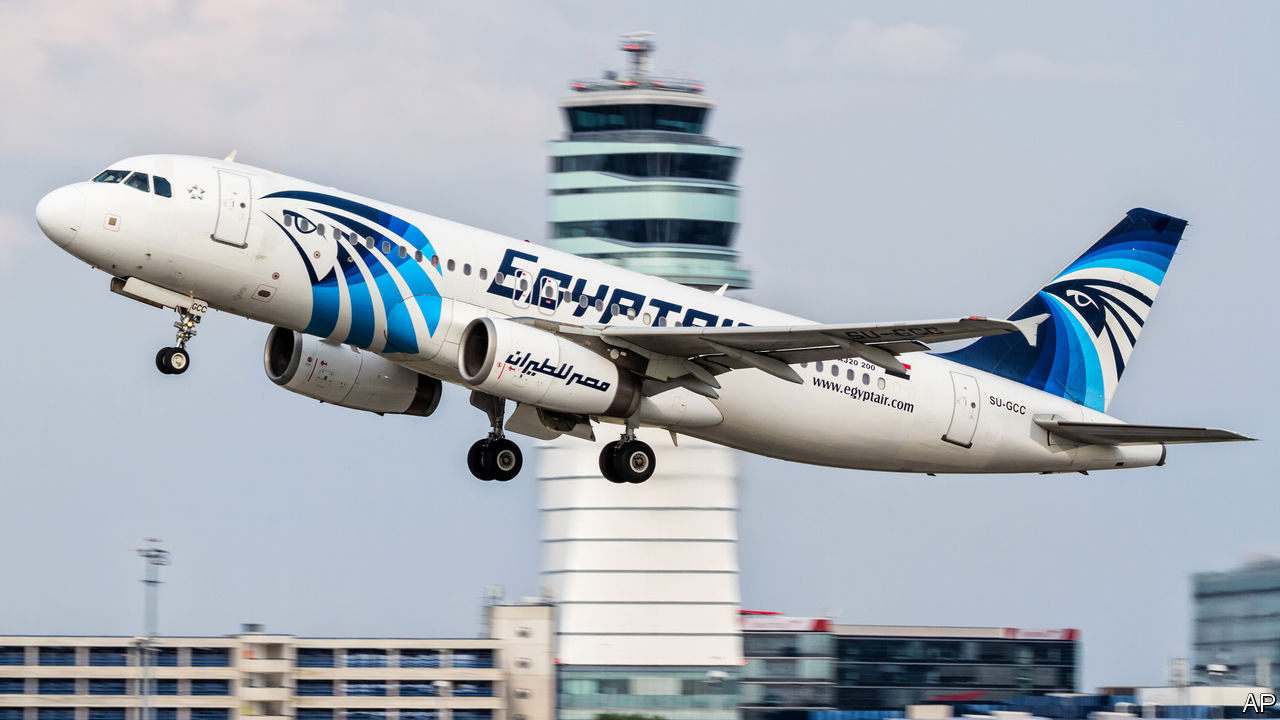
GULLIVER is not the type of person to kick up a fuss on his travels, least of all when lucky enough to be at the front of the plane. But his patience was pushed to the limit a couple of years ago, when his EgyptAir flight from Cairo to London was blighted by the near-constant stench of cigarette smoke wafting in from the cockpit. Shackled by British meekness and an unwillingness to challenge a flight crew, your asthmatic correspondent suffered the coughs and tried instead to focus on work. Conversations with Egyptian friends later revealed that on-board cigarette smoke is hardly a rarity when flying with the North African flag-carrier.
Naturally, anecdotes such as this provide only a snapshot of an airline’s safety standards. But it is a deeply disturbing snapshot given the stalled investigation into EgyptAir Flight 804, which crashed into the Mediterranean Sea during a routine flight from Paris to Cairo in 2016, killing all 66 people aboard. This month, France’s air-crash investigation agency, BEA, took the unusual step of criticising the official Egyptian investigation into the disaster. The French body rejects Egypt’s conclusion that a “malicious act” likely brought down the plane. When BEA was shown supposed evidence of explosive traces on the remains of some of the victims two years ago, it suggested that the test results may have been tampered with. It believes that a fire likely brought down the aircraft, basing its conclusion on three pieces of evidence: electronic signals sent from the plane indicating that smoke alarms were activated in the toilet and avionics bays; cockpit voice recordings that show the flight crew discussing an on-board fire; and wreckage that bears signs of high temperatures and soot.
-
Imagining the “Trump in Europe” opera
-
Why Binyamin Netanyahu is fudging east European history
-
France’s victorious footballers do Emmanuel Macron a favour
-
Some gender-critical voices are not being heard as they should
-
What sovereignty means for America’s Indian tribes
-
France wins the World Cup, beating Croatia 4-2
Egypt has form for covering up air-crash investigations when it does not like where the facts are leading. Two decades ago, it rejected the findings of America’s National Transportation Safety Board (NTSB), the foremost global authority in air crash investigations, when EgyptAir Flight 990 plunged into the Atlantic Ocean after taking off from New York. The NTSB—along with the entire global aviation community—believes that pilot suicide caused the disaster. Egypt blames a mechanical fault. Three years ago, Egyptian officials spent months denying that a bomb had brought down Metrojet Flight 9268, a Russian charter flight travelling from Sharm El Sheikh to St Petersburg. Their stance grudgingly shifted when it became clear that several European countries would keep travel bans in place until airport security had improved at the Red Sea resorts. In both cases, Egypt defied international consensus and sought to push a narrative that absolved its institutions of any blame. Its suggestion that terrorists destroyed Flight 804 fits with this pattern: any airport-security breach would this time be attributed to Paris Charles de Gaulle Airport, the last place where passengers and cargo were loaded onto the jet.
Unearthing the truth about Flight 804 will not bring back the 66 victims. But it may bring some closure to their relatives. And, if lessons can be learned, it probably will help save lives in future. BEA notes that Egypt ignored requests to conduct further tests relating to the fire theory and then failed to publish a final report into the crash. Without this, it says it has no platform on which “to set out its differences of opinion, as authorised by the international provisions”. This response, like Gulliver’s, is too timid. The French body should take its concerns directly to the European Aviation Safety Agency (EASA), which has the power to ban EgyptAir from the European Union’s skies if it believes the airline’s regulator is failing to abide by international norms for air crash investigations.
Source: economist
What really happened to EgyptAir Flight 804?